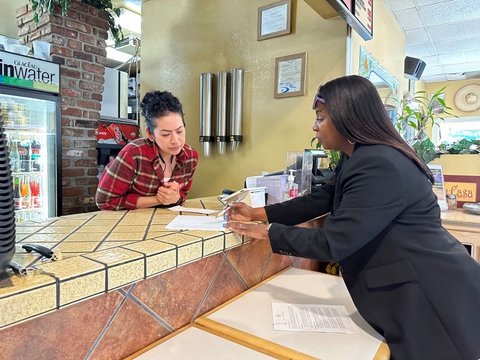
12 Jun California’s Small Businesses to Become Stronger, Greener With Inflow of Climate Resilience Funding

Lila Brown | California Black Media
The state of California, in conjunction with the federal government, has allocated millions of dollars for small businesses in California to help them become greener and to strengthen their resilience to climate change.
However, many Black business owners across California say there is an information gap — they have never heard of those climate-focused grants and other funding opportunities.
“In my community, we struggle to access information about available programs. Historically, by the time we hear about these opportunities, the funds are usually all gone, or the programs have ended, said Perry Bennett, the owner of Perry’s Joint, a “handcrafted gourmet sandwich shop” in Pasadena.
“We are always eager to grow our businesses, but we just don’t know what’s available. I’ve been in business for 30 years, and the cost of doing business has only increased,” Bennett added. “We want to use energy-efficient equipment, but we are a mom-and-pop operation. Help us out. We don’t even have the resources to take advantage of the resources.”
>>>Read: Small Business Owners Need a Lift Up, Not a Handout
To identify what it would take to help businesses like Perry’s Joint, The Center by Lendistry, a nonprofit focused on helping to close the racial wealth gap by connecting small businesses to financial and other resources, has launched a new effort.
In partnership with the city of Pasadena’s Economic Development Division, The Center by Lendistry hosted a “Small Business Green Survey Crawl” in Northwest Pasadena on May 30.
Small teams of volunteers visited local businesses to survey their efforts and challenges in becoming more resilient to climate impacts.
The Center by Lendistry’s efforts in Pasadena are part of a larger movement by local cities and municipalities, nonprofit organizations (Community Development Financial Institutions) to ensure that Black businesses and other minority-owned enterprises are not left behind as America and the world transition to a green economy.
The Center volunteers assessed awareness and accessibility of existing programs that assist businesses in improving energy efficiency and upgrading equipment. The information collected will help The Center and the city create strategies to ensure small businesses benefit from federal, state, and local programs designed to support climate resiliency.
“I applaud The Center and the City for bringing small business owners into the conversation about the effects of climate change,” says Everett K. Sands, CEO of Lendistry. “We’re doing what we can to ensure underserved businesses have access to resources so they can participate in the green economy.”
Lendistry leaders say the information gleaned from the survey will influence decisions about funding small business resilience to climate change. They hope the programs they design based on the information they collect from the crawl will be used as models for others around California and across the country.
Northwest Pasadena was selected for the Crawl because it is the only area in Pasadena designated as a California Disadvantaged Community by the state. This historically Black neighborhood and its distinct commercial districts is home to a diverse range of minority- and women-owned businesses, including both legacy establishments and emerging enterprises.
This year, the federal Environmental Protection Agency began distributing funds from the Greenhouse Gas Reduction Fund. GGRF is a $27 billion federal program to address the climate crisis. The fund will use financing and private capital to support clean energy and climate projects that reduce pollution, with a focus on benefiting low-income and disadvantaged communities.
Climate change poses significant challenges for small businesses, including damage from extreme weather events and financial losses. Regulatory compliance with new environmental standards often requires costly upgrades, and limited access to capital for resilience investments makes it difficult for small businesses to thrive.
Early survey results from the Crawl show that small business owners want to make their buildings more energy efficient but find it challenging to do so.
“I’m constantly looking for ways to cut back. I looked into solar, but the program I found only allows you to put in enough panels to deal with the current load. I couldn’t cover the whole roof,” one Pasadena business owner who asked to be anonymous shared.
The Center also recently partnered with the city of San Fernando to extend climate resilience support and resources to local businesses.
The Center is also supportive of Blue Sky Center of Cuyama Valley located in rural north Santa Barbara County. That project is actively engaged in several resilience projects. Their cutting-edge hydro panels pilot project delivers pure drinking water from the air, bypassing the need for groundwater or bottled water deliveries. This initiative not only tackles environmental concerns but also aims to empower residents in a drought-affected community, reducing utility bills, upgrading homes, and ensuring a dependable source of clean drinking water.
Advocates say Black communities throughout California have historically faced disproportionate environmental burdens.
“By prioritizing these communities for climate resilience funding and support, we are working to reverse decades of inequity and ensure that the benefits of the green economy are equitably distributed,” read a statement from the Center.
“The insights from the ‘Green Survey Crawl’ in Pasadena will inform strategies and programs that can be replicated in communities not only in the state, but across the country, amplifying the impact of our work.”






No Comments